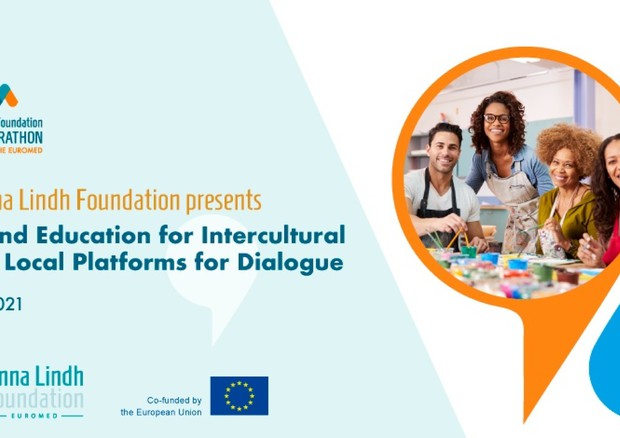A webinar titled "Arts and Education for Intercultural Cities: Local Platforms for Dialogue" was held on June 9 as the fourth public dialogue in the Virtual Marathon for Dialogue in the EuroMed Region, sponsored by the Anna Lindh Foundation (ALF).
It highlighted how art is a "powerful tool" for better living in multicultural environments, as well as how it can help in educational processes and is a tool for breaking down barriers and facilitating dialogue in the Euro-Mediterranean area.
The Virtual Marathon runs through June 29 with dozens of events planned.
At the June 9 webinar, participants included Eleonora Insalaco from ALF; Raffi Feghali, a Lebanese performer and consultant for peacebuilding; Loizos Loukaides from the Association for Historical Dialogue and Research (AHDR) of Cyprus; Andi Rebiaji from the "Youth Voice" network of organisations in Albania; Mónica Salas Corrigan, president of the Portuguese association Aequalitas; Aymen Bouazizi, program manager of Youtheon in Tunisia; Karl Donert of the European Association of Geographers (Eurogeo); Piaras Mac Einri of University College of Cork; and Federico Grandesso, journalist and member of Fondazione Fellini.
The webinar was moderated by Aissam Benaissa from the organisation Connect NordAfrika.
During the event, Insalaco showed data from the ALF Investigation into Intercultural Trends 2020, which showed that the majority of those surveyed in Europe and eastern and western Mediterranean countries feel that cultural and artistic initiatives are effective ways to improve life in multicultural environments.
The survey respondents also considered schools the places in which children learn how to live in diverse environments.
"It is on a local level that we can have sustainable practices that can bring change and transformation of attitudes and behaviors," Insalaco said.
She highlighted the need for a "systemic approach" to this change.
Participants in the webinar discussed the value of art for promoting intercultural dialogue, policies for a Euro-Mediterranean model of intercultural cities, and
educational initiatives in artistic environments on the city level for sustainable development.
They also shared best practices.
Bouazizi emphasised the importance of informal eduation and "the crucial role of NGOs in building strong and peaceful communities".
The topic of migrant integration also came up during discussion.
Mac Einri said the challenge is "creating channels for connecting people, and cities are the place where this happens", and gave concrete examples of successful initiatives in sport, food and art.
"We are all equal as human beings, but we have to also look at diversity, be aware of it and place value on all the factors that make us unique," Corrigan said, adding that "this can be obtained with art".
In terms of the educational environment, Feghali suggested "using art not as a tool, but as a necessary approach, a methodology" He explained that "the multimodality of art stimulates multiple parts of the brain".
To promote intercultural dialogue, Loukaides highlighted the need for "expanding local networks, including people who aren't in the region".
Rebiaji suggested an "informal and formal education" approach, promoting "education among equals as an informal learning process that gives young people confidence and independence".
Grandesso illustrated Fondazione Fellini's dialogue and integration initiatives, including a school with photography and cinema courses in Switzerland and projects with young migrants.
Finally, Donart placed the focus on the topic of digitalisation in society and education, highlighting the risks, but reiterating how this "offers new opportunities for involving more people in intercultural dialogue".
In collaborazione con:
Pomilio Blumm
